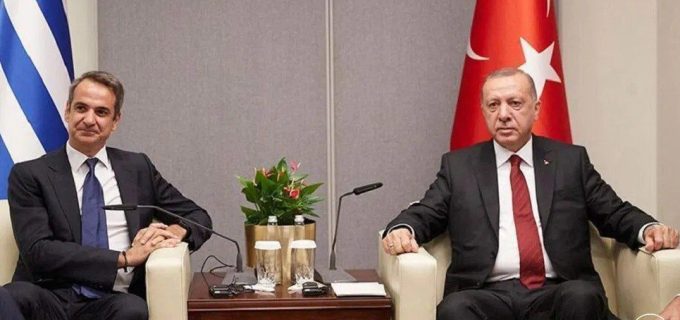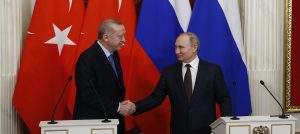Tension returned between Turkey and Greece regarding natural gas reserves in the Eastern Mediterranean. The dispute restarted following the signing of the border agreement between Greece and Egypt on August 6, in which Turkey saw a flagrant violation of its continental shelf. This prompted it to announce the return of its drilling expeditions in the Mediterranean, which had stopped temporarily following German and European mediation.
Relations between Ankara and Athens have been through difficult stages. They were complicated by a number of historical files related to the land and sea borders, territorial waters, airspace and the island of Cyprus. These complications were heightened by Mediterranean expeditions for oil and gas, the refugee file, Greece’s hosting of a number of Turks linked with the attempted coup, and the dispute over Aya Sofia.
The relationship became more tense after the recent events in Libya and the international and regional line-ups there, as well as the ambitions of some regional powers to take the battle to the Turkish neighbourhood. This was directly reflected in the Turkish-Greek dispute, in a move that may have unpredictable consequences, which may affect allied countries with Greece, as well as Greece itself.
This assessment of the situation examines the dimensions of the Turkish-Greek dispute over the Mediterranean expeditions, the international positions on the issue, and its future outcomes.
Dimensions of the Turkish-Greek discord
The dispute between Turkey and Greece is not a spur of the moment issue, nor is not limited to one file. There are multiple dimensions to the dispute, the most important of which are the political and economic dimensions.
Political dimensions
The Cyprus file is one of the points of contention between the two countries. Cyprus is an island that separates the two countries and is the third largest island in the Mediterranean after the islands of Sicily and Sardinia. Cyprus also occupies a notable strategic position where the three continents – Europe, Asia and Africa – meet. Turkey had ceded it to Britain under the Treaty of Lausanne, but Cyprus later gained its independence and tried to integrate with Greece. This provoked Turkey, which then took control of the Turkish part of it, and since then is considered a subject of dispute and contention between the two countries. Cyprus is now divided into Turkish Cyprus and Greek Cyprus, where Turkish Cypriots run the northern third of Cyprus, which is only recognised by Turkey; and Greek Cypriots manage the other two thirds, and their government is recognised internationally.
Although the Treaty of Lausanne on July 24, 1923, worked to settle the dispute between Turkey and the countries that were victorious in World War I, several files posed as a blemish in the agreement. An example of this are the disputed islands, where Turkey ceded 12 islands to Italy under the agreement, as well as 150 islands in the Aegean Sea. Italy handed the islands over to Greece, which became a naval blockade of Turkey.
Cyprus and the aforementioned islands represent a major point of contention in the Turkish-Greek conflict, but not on the whole conflict as there are several facets to the conflict with Greece. These include the control of airspace in the Aegean Sea, the limits of the continental shelf of the sea, the territorial water borders between Turkey and Greece, as well as ethnic and religious issues.
The island of Meis also became a point of contention in the dispute as Greece is trying to besiege the Turkish coasts through this island, which is only 2 km from the Turkish mainland, while it is 580 km from the Greek mainland. Turkey considers it to be a demilitarised island according to international agreements, and Greece sending soldiers to it violates The Paris Peace Agreement of 1947 which stipulates the disarmament of Meis island.
Greece relies on the Treaty of Lausanne and the United Nations Convention on the Law of the Sea. Turkey is not a member of the latter and feels that the Treaty of Lausanne wronged it. Greece was granted many islands that were historically affiliated with the Ottoman Empire; at the same time, it realises that the demarcation of maritime borders through the United Nations Convention on the Law of the Sea makes the Eastern Mediterranean a Greek lake. Greece believes that it is unreasonable for some Greek islands to have a continental shelf area and an economic zone that is equivalent to many times its area, and it stresses in its demands on the directions of international law that define economic zones based on distance from the mainland and not from the islands. Indeed, this is what it relied on in its agreement with Libya. Greece believes that major countries, such as the US, have not signed the United Nations Treaty on the Law of the Sea, and are thus not obligated to it. Furthermore, it believes that Turkish Cyprus has become an oppressed party, and thus it seeks to change the equation by redrawing the borders in a more equitable way.
Economic dimensions
Political rivalry is not the only cause of tension in the Eastern Mediterranean; indeed, there is a deep economic conflict, and the interest in the wealth of the Eastern Mediterranean is not an impromptu issue, but it began when Israel lay its demarcation of its maritime borders and the search for gas fields. This matter raised the concerns of the relevant countries, namely Turkey, Greece and Cyprus, as well as pushing a number of Arab countries to sign multiple border agreements, while some avoided signing an agreement with Greece as a result of Greece’s exaggeration of its perception of its maritime borders. Indeed, this is Turkey’s stance.
This region contains fields rich in natural gas. Indeed, a 2010 report by the US Geological Survey estimated that there are approximately 122 trillion cubic feet (or 3,455 billion cubic metres) of gas, as well as 1.7 billion barrels of oil in this region. These cast a shadow on the various alliances, instigating radical changes and reshaping policies, as is evident in the Eastern Mediterranean conflict.
Two major economic projects are also competing in this region, each of which seeks to extend the Eastern Mediterranean pipeline to Europe. The first pipeline is with Israeli approval, and seeks to transport gas to Europe via Cyprus and Greece. It is 1,900 km long and is named EastMed. The pipeline intersects with the area signed by Turkey and Libya. The second pipeline bears the name TurkStream and it is a Russian-Turkish line to transport Russian gas to Turkey and then to Southern and Western Europe. This project is rejected by the US and Israel.
This area has become a subject of international rivalry and a conflict zone between Turkey, Greece, Cyprus, Egypt and Israel. Furthermore, major global energy companies compete in it, such as: Italy’s Eni, France’s Total and Exxon of the US. Meanwhile, Turkey knows that it has the longest coast in the Eastern Mediterranean; removing influence over this matter will have strategic repercussions on Turkey’s position and its sources.
External positions
There are many international positions. Some countries openly declared their support for Greece, others played the role of mediator, while others remain neutral.
European Union
The EU has not adopted a unified position with regards to the Eastern Mediterranean. Whilst Germany plays a mediating role in its position as the President of the EU Council, France adopts a blatant stance against Turkey and tries to present itself as the guardian of the region (despite Italy being closer to it) and it seeks to push the EU to adopt the position that represents its point of view. Furthermore, France is leaning towards rapprochement with Russia to neutralise it in the battle with Turkey, a step which threatens its position with the US.
Paris decided to strengthen its military presence in the tension zone by sending two Rafale fighter jets and a naval frigate to the Eastern Mediterranean. Moreover, Greece announced military manoeuvres in the Eastern Mediterranean with the participation of Cyprus and France, and Greek Cyprus and Israel took a position in favour of Greece.
Greece was unable to attain a unified position in the EU. Indeed, Germany and Spain, and to some extent Italy, are trying to find a political solution to the dispute, and Turkey is trying to benefit from the German mediation, which is why it adopted the German proposal to make Sirte and Jufra a demilitarised zone, and suspended previous drilling operations in the Mediterranean based on German mediation. By this, Turkey was seeking to neutralise what it can with the EU countries, especially Germany and Italy. German efforts collided with Greece’s desire to escalate the crisis. The Greek-Egyptian agreement followed the mediation of its German leaders, which was perceived by Germany as a challenge to its efforts to resolve the dispute.
Greece recognises that it will not be able to confront Turkey on its own, and that is why it seeks with all its might to implicate the EU in a confrontation with Turkey, and to portray the dispute as a Turkish-European one. France stands firmly by it in this vision, whilst Turkey seeks to avoid it.
The US and NATO
The US is trying to benefit from the Turkish position by overhauling Russia’s expansion in the region. Although it has not declared its bias towards Turkey, it is more distant from Greece, and the Greek Prime Minister’s visit to the US did not result in a bilateral consensus against Turkey. What also affects the US position negatively is Trump’s personal perception of Macron, who seeks to integrate Russia into Europe through a European-Russian security system, which is inconsistent with US policy. Also affecting the US position is the military manoeuvres that the US conducted with Turkey in the Eastern Mediterranean.
These indicators do not indicate a clear US position, but they may show Turkey’s attempt to neutralise the US position, because the US would not be with Turkey in the position it adopts if it was not for fear of Russian expansion. This position may change if this fear fades, or if the US guarantees Russia’s exclusion. Furthermore, Trump’s policy is volatile, and this was apparent when he lifted the arms embargo on Greek Cyprus, which angered Turkey. In turn, Turkey threatened to respond similarly through the words of its foreign minister, who said: “The US decision to lift the arms embargo imposed on Greek Cyprus ignores the equality and balance between the two peoples on the island,” adding that in the event that the US does not reverse its decision, “Turkey, as a guarantor country, will take the necessary reciprocal steps in line with its legal and historical responsibility to guarantee the security of the Turkish Cypriot people.”
It seems that this decision came within the framework of the presidential election fever in an attempt to influence the voices of the Greeks in the US, as well as an attempt to engage Cyprus and limit Russia’s influence on it, not targeting Turkey per se.
As for NATO’s position, NATO Secretary-General Jens Stoltenberg said: “The Alliance is considering so-called deconfliction measures to prevent naval accidents in an increasingly congested region.” This statement is yet to be translated into action. Turkey and Greece have been members of NATO since 1952, out of fear for Soviet expansion at the time, and the relationship between them soon deteriorated over the island of Cyprus and the Aegean confrontations.
There is a desire from the US, as well as other countries, to not involve NATO in this conflict, so as not to get involved in conflicts between its members. In the event that NATO reaches practical steps to resolve the conflict, it is expected that the two parties will abide by them.
Russia
Russia seeks to expand as much as possible in the region, and to benefit from the two parties in the context of the existing dispute. Whilst Russia has a strong relationship with Greek Cyprus, it also seeks to secure its ships in the Mediterranean, secure supply stations for it, and extend a gas pipeline to Europe. Indeed, this is why it agreed to accompany Turkey in the expeditions of energy sources in the Eastern Mediterranean, as stated by Russian Energy Minister Alexander Novak. Novak indicated that his country’s companies are ready to cooperate with Turkey in the energy field in the Eastern Mediterranean.
Moscow also firmly seeks to preserve its position as a major supplier of gas in Europe, and thus, it is keen to strengthen its influence in the Mediterranean, and to benefit from its relationship and support for Greece and Greek Cyprus. In return, Turkey is waving the Russian paper as a message to NATO, announcing that Russia is preparing to conduct naval exercises with live ammunition in the Eastern Mediterranean this month. Ankara said that these manoeuvres will take place in the areas where the Turkish seismic surveys are conducted in search for energy resources.
Egypt
The Egyptian position is one of the closest and most relevant Arab positions to the issue and is one of the first to be affected by its repercussions, negatively or positively, because of the maritime borders that connect it with it. This is why although Egypt was previously aware of the complex situation in the Eastern Mediterranean, it did not draw its maritime borders except with Cyprus in 2003, contrary to Israel and Greece, despite Greece’s repeated request. Egypt avoided entering into an agreement with Greece before the Turkish-Greek border demarcations were drawn. Furthermore, Egypt was aware that any agreement with Greece would be within the limits of the Greek vision, which would mean that Egypt would lose areas of its economic zone, which is what indeed happened. If Egypt had signed an agreement with Turkey, it would have enhanced its area, providing it with an additional 26,500 km2 according to a study by the Arab Centre for Studies. The recent agreements between Athens and Cairo are possibly directed by immediate interests, ignoring the strategic interests that the Egyptian leadership was previously aware of.
Egypt adopted an anti-Ankara stance by hosting the Eastern Mediterranean Gas Forum at the beginning of 2019, but Egypt and the Arab countries that support it may not yet realise the routes of retreat in the event that Turkey and Greece reach a new political deal. Moreover, the Arab populations are fully aware of the dimensions of the conflict and the alliances that are formed, and this will affect the remaining legitimacy of these regimes.
Israel
The military and economic cooperation between Greece and Cyprus and Israel is not an impromptu one. Israel played a major role in discovering gas fields, and this is what pushed it to rapprochement with Greece and to sign agreements with it. In May of this year, representatives of the two governments signed an agreement to supply Heron UAVs which were designed for maritime surveillance. Through the agreement, Greek operators will be trained, and this system will be responsible for border security and maritime surveillance. The agreement covers three years of service, in addition to joint military exercises.
The EastMed pipeline project, which will connect natural gas fields in the Eastern Mediterranean basin with European markets, is met with Turkish opposition and would cross the signed Turkey-Libya economic zone. It seems that Israel needs Turkey to implement this pipeline, which could put pressure on Greece. The Turkish-Libyan agreement represented a strong card for Turkey, and this is what the Turkish president referred to in his saying: “Egypt, Israel and Greece cannot explore for oil in the Mediterranean without obtaining Turkey’s permission.”
Disagreement outcomes
The escalation of the dispute between Turkey and Greece this time entered a new phase due to current international polarisation and the overlap of many files. Some countries remain aware of the importance of benefiting from the situation without fully aligning with either parties to the conflict, and this puts us before a number of scenarios:
The first scenario: Widespread confrontation
This scenario assumes widespread military confrontation between Turkey and Greece due to the military deployment in the Eastern Mediterranean and the increasing movements. What reinforces this scenario:
– The escalation of the dispute and the worsening of the situation as a result of Turkish efforts to amend the agreements, and Greece’s keenness to adhere to the status quo.
– The growing military build-up on both sides and Greece’s militarisation of some of the islands, which Turkey would never accept.
– Intervention by regional and international parties to escalate the dispute, which may make its development possible.
This scenario, despite its possibility, remains the weakest scenario. What weakens it:
– The cost of all-out confrontations is extortionate, and it would not be in the interest of either of the parties of the conflict, nor in the interest of the region; and its repercussions would remain a long time.
– Some international parties sought to contain the two parties, such as NATO, the European Union, Germany and the US.
– The overlapping interests of the major countries in the region, which toughen the calculations and warrant any simple mistake as an opportunity for major powers to intervene to protect their ships, companies and interests in the region.
The second scenario: Partial confrontation and limited military friction
This scenario assumes the possibility of military frictions or partial confrontation, whereby one of the parties will be forced to confront the military escalation of the opposite party. This is a very realistic scenario, and it may be an entry point for negotiation. What strengthens this scenario:
– Greece’s escalation in the militarisation of the disputed islands, which may provoke Turkey’s previous experiences in the same matter: Cardak Island is one of the disputed islands, and its militarisation by Greece in 1996 provoked partial military confrontations between the two countries.
– The desire of some regional and international powers to busy Turkey in proximity to its borders in an attempt to limit what it sees as Turkish external expansion.
The third scenario: Stalling and trying to reach a new deal
This scenario assumes the continuation of the political escalation in a manner that does not lead to a widespread military outburst, with the development of negotiations and an attempt to reach a temporary deal that may not meet Turkish ambitions, but limits military escalation. If Greece refuses unconditional dialogue, it may comply with it in the future, or it may accept international arbitration because military confrontations would have catastrophic implications, not only to Greece and Turkey, but to the entire region, and would delay the process of benefiting from the gas fields. Similarly, a comprehensive settlement is unlikely. It can be achieved in the short term due to the complexity and intertwining of files.
A scenario of partial solutions and a limited deal, whether by negotiation or international arbitration, remains likely for a number of reasons:
– The military capabilities that Turkey has come to possess. Turkey has not been subject to the threats and sanctions imposed by NATO in previous wars between it and Greece, and today Turkey is stronger than it has been, and Greece is avoiding facing it alone, and is trying to present the dispute as a Turkish-European one, which may be difficult to achieve. Accordingly, it may succumb to some Turkish demands.
– Turkey has multiple cards from which to add pressure. It might select the option of introducing Russian companies, suspending their membership with NATO, controlling the disputed islands, or allowing the Turkish Cypriots to organise a referendum that would allow them to join Turkey, as well the refugee card. All these options would be annoying to the Europeans. Moreover, the safety and welfare of the region relies on Turkey’s approval, as is realised by most countries on the conflict map.
– Turkey’s endeavour to benefit from the roles of the US, Germany, Italy and Russia, or at least to neutralise them, and to affirm that the dispute is Turkish and Greek.
– Athens and Ankara are bound by common borders and interests. These are difficult for Athens to sacrifice for the interests of other countries.
– Turkish politics is usually conducted through civil mobilisation while keeping an eye on the negotiation table. Greece understands this as it resorted to the Egyptian-Greek agreement in light of rounds of negotiations with Turkey and settlements led by Germany, through which it wanted to strengthen its negotiating papers.
– Germany has a degree of pragmatism, and it seeks to search for a success story that strengthens its role in the European Union after Brexit, in light of the disagreement between Trump and Macron, which encourages it to continue consultations and try to reach a political solution, even if its partial.







